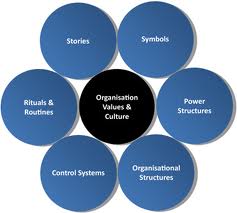Organizational culture is defined as an idea through management which entails attitudes, experiences, beliefs and values of an enterprise. When synchronizing with another corporation, it is not guaranteed that employees will adapt favorably to the change in corporate culture, due to the diversity of aspirations, and risk profiles. There are many variables in respect to different aspects of culture; for instance, two corporations may differ through their views on power distance, uncertainty avoidance, individualism vs. collectivism, or masculinity vs. femininity. Neither perspective is necessarily wrong; however, if an original company attracted feminist workers, due to its dominant femininity culture, a merge with another company that does not have a similar structure may make sense financially, but will certainly effect relations and productivity in the work place. Ultimately, this results in the inability to compromise on solutions, or losing the opportunity to agree upon and give closure on deals. Therefore, it is essential that cohesiveness is present between coworkers in both companies. In order to encourage this, management may look to incorporate aspects of both cultures in creating a compromising new culture that both companies can relate to as one unified entity.
http://www.smallbusinessnotes.com/operating/leadership/mergingwisely.html
